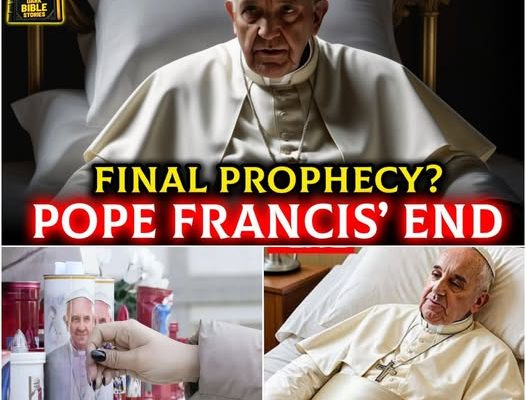Pope Francis’ tenure as the leader of the Catholic Church has been marked by progressive reforms, controversial statements, and an effort to modernize the institution. However, recent discussions have reignited a centuries-old prophecy that some claim foretells the end of the papacy as we know it. This so-called “Final Pope Prophecy” has long been dismissed by scholars and religious authorities, but its resurfacing has left many questioning whether there is a deeper meaning behind Pope Francis’ leadership and what could come next for the Vatican.

The origins of this prophecy trace back to Saint Malachy, a 12th-century Irish bishop who allegedly had a vision of all future popes, culminating in the reign of the last pope, referred to as “Peter the Roman.” According to Malachy’s prophecies, Pope Francis—believed to be the 112th pope on his list—would be the final pontiff before the Church enters a period of great turmoil and possible destruction. Although these predictions have been widely debated, their eerie accuracy in aligning with historical events continues to fuel speculation.

Some interpretations suggest that Pope Francis represents the final stage of the traditional papacy due to his unprecedented approach to leadership. Unlike his predecessors, he has advocated for radical changes within the Church, challenging long-held traditions and advocating for inclusivity. His stance on issues such as climate change, LGBTQ+ rights, and financial transparency has won him admiration among progressives but has also drawn sharp criticism from conservative factions within the Vatican. This internal conflict has led some to believe that the Catholic Church is on the brink of a significant transformation—or even collapse.
Adding to the mystery, Pope Francis himself has alluded to the possibility that his time as pope may soon come to an end. In multiple interviews, he has openly discussed the idea of resignation, much like his predecessor, Pope Benedict XVI. If Pope Francis were to step down or if his health were to fail, it would mark a dramatic shift in the Vatican’s history, reinforcing the belief that the prophecy of the final pope is unfolding before our eyes.
Moreover, geopolitical tensions and growing secularization worldwide have weakened the influence of the Catholic Church. With declining church attendance, scandals involving clergy members, and increasing scrutiny over the Vatican’s financial dealings, many wonder if the institution can withstand these mounting pressures. Some conspiracy theorists argue that powerful forces within the Church have tried to suppress the discussion of the prophecy to prevent panic and maintain control.
Whether or not one believes in the prophecy, there is no denying that Pope Francis’ leadership is shaping a new chapter for the Catholic Church. His tenure has been marked by unprecedented changes, sparking both hope and fear for the future of the faith. If this truly is the final papacy, what will become of the Church? And if another pope follows, will he be able to navigate the growing divisions within Catholicism?
For now, the world watches as Pope Francis continues his mission, while the whispers of the “Final Pope Prophecy” refuse to fade into obscurity.



